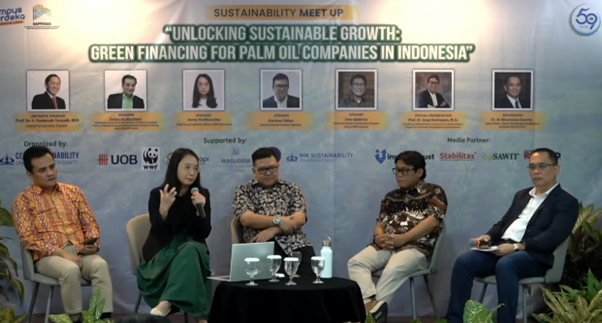Indonesia Achieves 62.5% of SDG Targets, Leading Among Upper-Middle-Income Countries

(Source: menpan.go.id)
Indonesia has demonstrated substantial progress in its commitment to the Sustainable Development Goals (SDGs), a global initiative aimed at creating a more inclusive, equitable, and sustainable world by 2030. As of now, the country has successfully achieved approximately 62.5% of its SDG indicators, which translates to 139 out of the total goals. This achievement places Indonesia far ahead of the global average, which currently stands at only 17%.
This remarkable progress was highlighted by Setyo Budiantoro, Manager of the Economic Development Pillar at the SDGs Secretariat under the National Development Planning Agency (Bappenas/Ministry of National Development Planning), during a discussion titled “Unlocking Sustainable Growth: Green Financing for Palm Oil Companies in Indonesia”. The event took place at Trisakti University, Jakarta, on Tuesday, November 5, 2024.
“In terms of global progress, SDG implementation remains sluggish and concerning. However, Indonesia stands out as the leading country among upper-middle-income economies in terms of SDG achievement,” said Setyo during the discussion.
According to data provided by the United Nations Sustainable Development Solutions Network (UN SDSN), Indonesia’s SDG commitment is not only the highest in Asia, but also ranks seventh globally. “We are only behind several Scandinavian countries, and Indonesia is increasingly being viewed as a model for other nations seeking to enhance their SDG performance,” he explained.
Despite these encouraging developments, Setyo acknowledged that Indonesia still faces significant challenges, particularly regarding funding. Prior to the COVID-19 pandemic, the estimated financial requirement to achieve the SDGs in Indonesia for the 2020–2030 period was around IDR 67,000 trillion, with a financing gap of about IDR 14,000 trillion.
However, in the wake of the pandemic, the funding needs have significantly escalated. The latest estimates suggest that Indonesia now requires IDR 122,000 trillion in total to fulfill its SDG commitments by 2030. This surge has also increased the financial gap to an estimated IDR 24,000 trillion.
In response to these challenges, Setyo called for enhanced collaboration and collective effort across all sectors. “Achieving these ambitious goals cannot rely on government resources alone. It will require innovative and blended financing models involving the public and private sectors, banking institutions, non-bank financial actors, impact investors, and philanthropic organizations,” he emphasized.
Indonesia is already making notable progress in this direction. Setyo highlighted that the country is considered one of the most advanced among 44 emerging economies in the area of sustainable finance. This progress includes the development of green bonds, sustainable financial instruments, and regulatory frameworks that promote environmentally and socially responsible investments.
“Indonesia has made significant advancements in integrating sustainability into its financial system. These efforts are crucial not only for closing the funding gap but also for ensuring long-term growth that benefits people, planet, and prosperity,” Setyo added.
The discussion at Trisakti University was organized by CECT Sustainability, an institution focused on sustainable business practices and corporate responsibility. The event gathered experts, academics, and industry leaders to explore strategies for promoting green finance, especially in sectors like palm oil, which play a key role in the national economy yet often raise environmental concerns.
By pushing for responsible investment, inclusive growth, and shared accountability, Indonesia aims to keep up its momentum in SDG implementation. Setyo concluded with a call to action: “With the right support, innovation, and collaboration, Indonesia has the potential not only to meet its 2030 goals but also to inspire others in the global community.”




Comments :